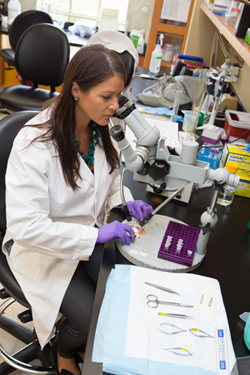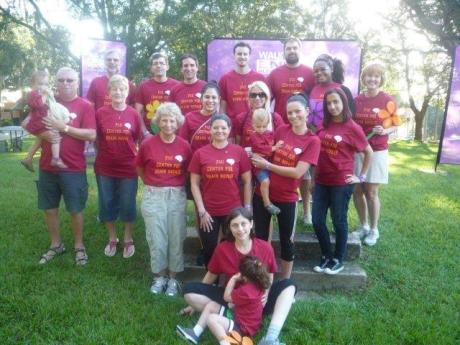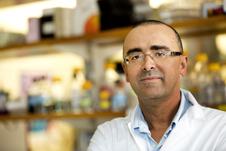From Florida to France: Student Wins Fellowship
 In the span of one year, Melissa Martin has gone from being uncertain she’d get the spot she wanted in the College of Medicine’s doctoral program to winning a prestigious research fellowship that will soon take her to Paris.
In the span of one year, Melissa Martin has gone from being uncertain she’d get the spot she wanted in the College of Medicine’s doctoral program to winning a prestigious research fellowship that will soon take her to Paris.
As a Chateaubriand Fellow, Martin could be one step closer to achieving her goal of becoming a funded research scientist.
“I’m hoping that what I learn in Paris, which includes really great techniques, I’ll be able to apply to the research we are doing here at the FSU College of Medicine,” Martin said. “I’ll be able to get a really good publication out of it that is both interesting and medically relevant.”
And, with that, she’ll be a better candidate for both research funding of her own and, eventually, an interesting postdoctoral position.
First things first.
While trying to decide which biomedical sciences doctoral program would be the best match for her interests, Martin received good news from a friend. The FSU College of Medicine had just hired distinguished neuroscientist Pradeep Bhide.
“He studies developmental disorders, so it was everything I was interested in,” said Martin, who received a master’s in neuroscience from FSU in 2011 before taking a job doing toxicology and chemistry in Michigan. “I thought it was perfect to come back to FSU to work with Dr. Bhide.”
At the time, Bhide wasn’t sure he’d be able to take on a doctoral candidate, but he agreed to interview Martin, whose master’s focus was on neurotransmitter systems involved in developmental disorders and social behavior.
When he saw how closely her research interests and previous training aligned with the work being done in his lab, Bhide offered Martin a graduate research assistant position.
“When I saw Melissa’s resume, and when I interviewed her, I was convinced that she had the background, preparation, motivation and commitment needed to pursue a career in neuroscience,” he said.
Bhide is director of the Center for Brain Repair at the College of Medicine and is the Jim and Betty Ann Rodgers Eminent Scholar Chair of Developmental Neuroscience. The decision to set her sights on a place in Bhide’s lab was a good one for Martin.
Christine Métin, a scientist at the Institut du Fer à Moulin in Paris, has collaborated with Bhide on previous research. She contacted him to see if he knew of any good candidates for the Chateaubriand Fellowship, which receives hundreds of applications each year for 30 available positions.
“My research collaboration with Dr. Métin is very closely related to the research project Melissa was proposing for her graduate thesis work,” said Bhide. “Therefore, when Christine mentioned the Chateaubriand Fellowship, Melissa was my natural choice. I knew also that Melissa would enjoy the challenge and training opportunities associated with working with Christine in the preparation of the application, and eventually performing new research in Christine’s lab in Paris.”
The fellowship is sponsored by the Embassy of France in the United States, which offers U.S. doctoral students in STEM disciplines the opportunity to participate in research in a French lab. The six-month fellowship includes travel expenses, health insurance and a $1,400-a-month stipend.
At the Institut du Fer à Moulin, where research centers on the development and plasticity of the nervous system, Martin plans to learn Métin’s expertise in a technological skill not yet employed in Bhide’s lab.
“I’ll be learning the live cell imaging technique,” said Martin. “It will allow us to investigate the cellular and molecular mechanisms involved in neuron migration during early brain development.”
In Bhide’s lab, Martin studies inhibitory and excitatory dopamine receptors and the neurological effects of prenatal nicotine exposure.
Martin believes the combination of what she’ll learn through the fellowship and what she is learning from Bhide will prepare her for her career goals.
“I want to apply my knowledge of developmental disorders, in combination with epigenetics research, to people,” she said. “And to understand, for example, what is happening with increased risk of autism.”
Visit the Office of Graduate Fellowships and Awards to learn more about external awards and resources at FSU to assist during the application process.



